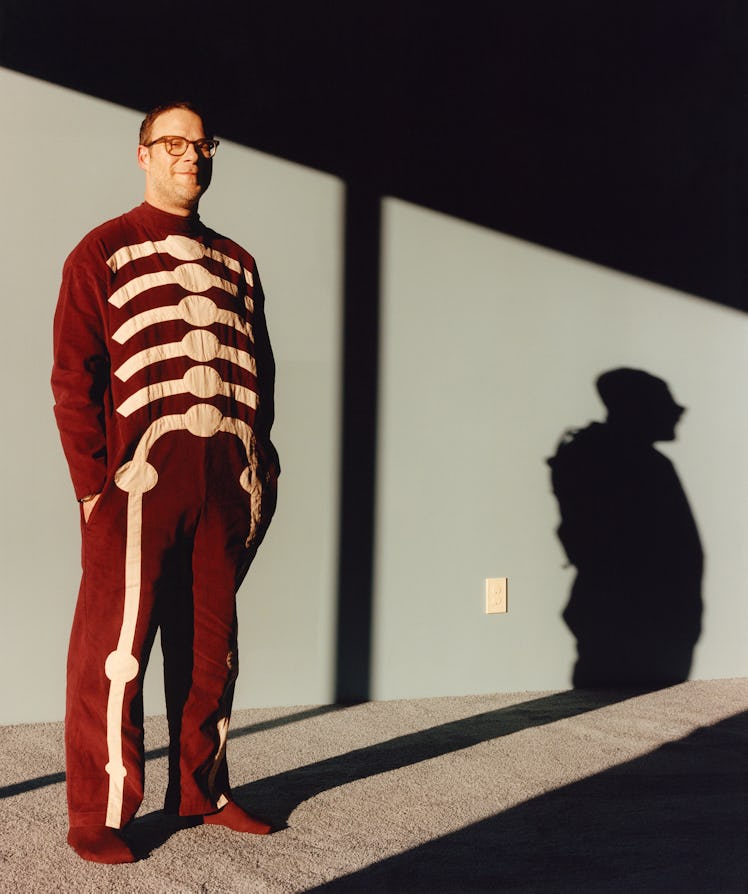Seth Rogen Digs Deep
The actor opens up about his “sensitive role” in The Fabelmans and how he got rid of his Spielberg-induced nerves.

Seth Rogen’s career has spanned silliness (Sausage Party, Superbad) and cynicism (Freaks and Geeks), but he always brings a sense of gregarious authenticity to everything he does (from The 40 Year-Old Virgin to Steve Jobs). In 2022, he played his most nuanced role yet, as Uncle Bennie in The Fabelmans, a fictionalized version of director and cowriter Steven Spielberg’s life. In conversation with W, the comedian, actor, and writer talks about his parents’ early support of his career, getting rid of Spielberg-induced nerves on set, and the similarities between Superbad and his latest film.
You have a long history with Steven Spielberg.
My first job was on the show Freaks and Geeks, produced by Steven. So, I’ve met him over the years. During the height of the pandemic, I got a call that he wanted to talk to me, but I never thought he would be asking me to act in a film. He said, “Will you read the script?” And I said, “I don’t need to read the script—I will do it.”
The character you play is named Uncle Bennie. Did Spielberg give you any information about the real Bennie?
He described the real Bennie as someone who was full of life and gregarious and had a big personality—fun loving and freewheeling and a lot of words that honestly do not necessarily describe me [Laughs] but hopefully things I can play. Bennie is a very sensitive role, and I obviously asked [Spielberg] a lot of questions about his real life and how accurately the film reflected it. And every time I asked him if something happened, he would say, “Yes, that happened.” Never did he say, “No, that didn’t happen."” So, yeah, it was shockingly true to life.
Were you nervous?
I knew I had to get rid of all of my nerves, so I kept going to set. For hours. I’d show up at 10 a.m. and stay until 6, or sometimes later. I would sit next to Steven, and I’d watch him direct the other actors.
You’re so important to the movie because you give it a certain energy—there’s a certain life that you give to the camera.
It’s so funny, ’cause we’ve been doing a lot of press, and Judd Hirsch keeps saying, like, you know, “When Steven pitched me the role, what he said to me was, ‘You’re the guy who made me want to be a director.’” And I keep being, like, “Yeah, he said the same thing to me, Judd.” [Laughs] But I hate to burst his bubble.
In The Fabelmans, Spielberg is dramatizing his own life. You did the same thing in Superbad.
Steven was nervous that his life was not interesting enough. I said, “For Superbad, all I was doing was buying beer, and I decided that would be an interesting story. And I was right!”
Who believed in your talent when you were growing up?
My parents. I was 13 when I started doing stand-up in Vancouver, and my mother drove me to every stand-up show. She watched hundreds of sets. I would tell filthy jokes in front of my mother. When I was writing Superbad, she would read drafts of it. I needed this program to write screenplays, called Final Draft, which costs hundreds of dollars. That was my equivalent of needing a camera, you know? And my parents bought it for me, no problem, and they didn’t have a ton of money, but they were happy to. I look at my writing partner, Evan, whose parents could not have been more discouraging. And it gives me such great joy to bring up my parents’ support at every interview I can, with the hope that they’ll come across it.
Hair for portfolio by Anthony Turner at Streeters; makeup for portfolio by Lucia Pica for Byredo at Art Partner. Senior style editor Allia Alliata di Montereale; senior fashion market editor Jenna Wojciechowski. Manicure for portfolio by Michelle Saunders. Set Design by Gille Mills at 11th House.
Produced by Connect the Dots; executive producer: Wes Olson; producer: Zack Higginbottom; production manager: Nicole Morra; photo assistants: Cecilia Byrne, Jack Buster, David Gurzhiev; retouching: Simon Thistle; fashion assistants: Julia McClatchy, Tori López, Jacqueline Chen, India Reed, Nycole Sariol, Derek Ezra Brown, Karla Garcia, Rosa Schorr; production assistants: Khari Cousins, Tchad Cousins, Kelsey Swope Romero, Mateo Calvo, Juan Calvo, Rayon Pollard, Gina York, Peter Ditzler, Nico Robledo; hair assistants: John Allan, Dylan Michael, Ramdasha Bikceem, Malika Palmer; makeup assistants: Kate O’Reilly, Lilly Pollan, Bailee Wolfson; manicure assistants: Pilar Lafargue and Victoria Valenzuela, Jolene Brodeur; set assistants: Cory Bailey, Dirk Knibbe, Joel Garcia, Matt Day; tailors: Irina Tshartaryan, Ripsime Vartanyan at Susie’s Custom Designs, Inc.